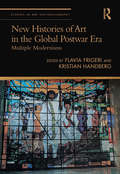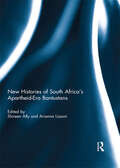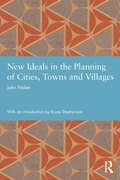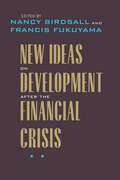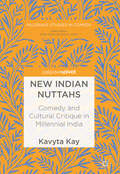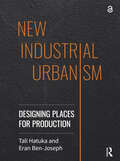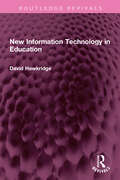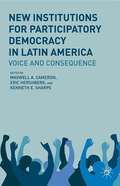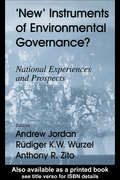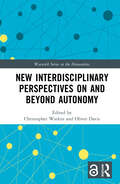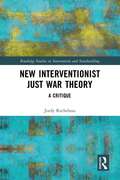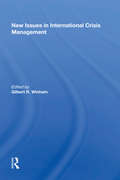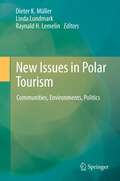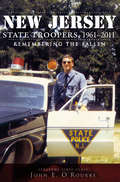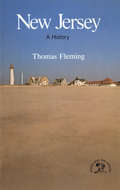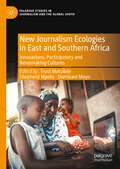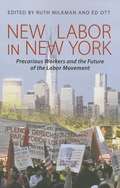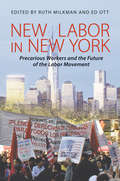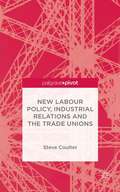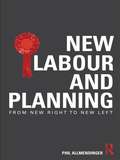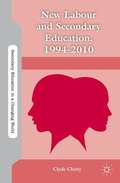- Table View
- List View
New Histories of American Law: Law and Religion in American History
by Mark Douglas McgarvieThis book furthers dialogue on the separation of church and state with an approach that emphasizes intellectual history and the constitutional theory that underlies American society. Mark Douglas McGarvie explains that the founding fathers of America considered the right of conscience to be an individual right, to be protected against governmental interference. While the religion clauses enunciated this right, its true protection occurred in the creation of separate public and private spheres. Religion and the churches were placed in the private sector. Yet, politically active Christians have intermittently mounted challenges to this bifurcation in calling for a greater public role for Christian faith and morality in American society. Both students and scholars will learn much from this intellectual history of law and religion that contextualizes a four-hundred-year-old ideological struggle.
New Histories of American Law: Making Foreigners
by Kunal M. ParkerThis book reconceptualizes the history of US immigration and citizenship law from the colonial period to the beginning of the twenty-first century by joining the histories of immigrants to those of Native Americans, African Americans, women, Asian Americans, Latino/a Americans and the poor. Parker argues that during the earliest stages of American history, being legally constructed as a foreigner, along with being subjected to restrictions on presence and movement, was not confined to those who sought to enter the country from the outside, but was also used against those on the inside. Insiders thus shared important legal disabilities with outsiders. It is only over the course of four centuries, with the spread of formal and substantive citizenship among the domestic population, a hardening distinction between citizen and alien, and the rise of a powerful centralized state, that the uniquely disabled legal subject we recognize today as the immigrant has emerged.
New Histories of Art in the Global Postwar Era: Multiple Modernisms (ISSN)
by Flavia FrigeriThis book maps key moments in the history of postwar art from a global perspective. The reader is introduced to a new globally oriented approach to art, artists, museums and movements of the postwar era (1945–70). Specifically, this book bridges the gap between historical artistic centers, such as Paris and New York, and peripheral loci. Through case studies, previously unknown networks, circulations, divides and controversies are brought to light. From the development of Ethiopian modernism, to the showcase of Brazilian modernity, this book provides readers with a new set of coordinates and a reassessment of well-trodden art historical narratives around modernism. This book will be of interest to scholars in art historiography, art history, exhibition and curatorial studies, modern art and globalization.
New Histories of Art in the Global Postwar Era: Multiple Modernisms (Studies in Art Historiography)
by Flavia FrigeriThis book maps key moments in the history of postwar art from a global perspective. The reader is introduced to a new globally oriented approach to art, artists, museums and movements of the postwar era (1945–70). Specifically, this book bridges the gap between historical artistic centers, such as Paris and New York, and peripheral loci. Through case studies, previously unknown networks, circulations, divides and controversies are brought to light. From the development of Ethiopian modernism, to the showcase of Brazilian modernity, this book provides readers with a new set of coordinates and a reassessment of well-trodden art historical narratives around modernism. This book will be of interest to scholars in art historiography, art history, exhibition and curatorial studies, modern art and globalization.
New Histories of South Africa's Apartheid-Era Bantustans
by Shireen Ally and Arianna LissoniThe bantustans – or ‘homelands’ – were created by South Africa’s apartheid regime as ethnically-defined territories for Africans. Granted self-governing and ‘independent’ status by Pretoria, they aimed to deflect the demands for full political representation by black South Africans and were shunned by the anti-apartheid movement. In 1972, Steve Biko wrote that ‘politically, the bantustans are the greatest single fraud ever invented by white politicians’. With the end of apartheid and the first democratic elections of 1994, the bantustans formally ceased to exist, but their legacies remain inscribed in South Africa’s contemporary social, cultural, political, and economic landscape. While the older literature on the bantustans has tended to focus on their repressive role and political illegitimacy, this edited volume offers new approaches to the histories and afterlives of the former bantustans in South Africa by a new generation of scholars. This book was originally published as various special issues of the South African Historical Journal.
New Ideals in the Planning of Cities, Towns and Villages: Town And City Planner (classic Reprint) (Studies in International Planning History)
by John NolenJohn Nolen’s New Ideals in the Planning of Cities, Towns, and Villages is the most thorough assessment of city planning written by an American practitioner before 1920. It records the interplay of urban reform in Europe and the United States, the rise of the planning expert, the design of new towns, and the technique for directing urban expansion on systematic lines. Most important, it documents the blueprint for investing the "peace dividend" of the Great War to make urban life "more fit for democracy". Written for men fighting to make the world safe for democracy, New Ideals revealed how the domestic part of the peace program could justify their sacrifice. The wartime housing initiative had improved the living conditions of industrial workers and the same public regulation and control of the layout and character of residential neighbourhoods could provide what "men of service expect to find on their return, a new and better type of workman’s home." While New Ideals strained towards the utopian, experience tempered Nolen’s expectations and the high aims of the book were not immediately realised in a post-war society seeking a return to pre-war normalcy. However in the last decade, Nolen’s planned communities have been closely studied as the demand for pedestrian-oriented neighbourhoods set on sustainable lines has moved from novelty to policy. New Ideals is an important text not only for its design template, but also its aspirations. Nolen’s call to "make cites that will serve the needs--physical, economic, and spiritual-- of all people" lays at the heart of the city planning profession and the lessons Nolen imparted inform a new generation planning cities to be both resilient and just.
New Ideas on Development after the Financial Crisis (Forum on Constructive Capitalism)
by Nancy Birdsall, Francis FukuyamaThe global financial crisis of 2008–9 has changed the way people around the world think about development. The market-friendly, lightly regulated model of capitalism promoted by the United States is now at risk, and development thinking worldwide is at something of an impasse. Editors Nancy Birdsall and Francis Fukuyama bring together leading scholars to explore the implications of the global financial crisis on existing and future development strategies.In addressing this issue, the contributors contemplate three central questions: What effect has the crisis had on current ideas in development thinking? How has it affected and how will it affect economic policy and political realities in Latin America and Asia, including China and India? Will the financial collapse reinforce shifts in geopolitical power and influence, and in what form? Essays answering these questions identify themes that are essential as economic and political leaders address future challenges of development.To help move beyond this time of global economic turmoil, the contributors—the foremost minds in the field of international development—offer innovative ideas about stabilizing the international economy and promoting global development strategies. Contributors: Nancy Birdsall, Center for Global Development; Michael Clemens, Center for Global Development; Kemal Derviş, Brookings Institution; Larry Diamond, Stanford University; Francis Fukuyama, Stanford University; Peter S. Heller, Johns Hopkins University; Yasheng Huang, Massachusetts Institute of Technology; Justin Yifu Lin, World Bank; José Antonio Ocampo, Columbia University; Mitchell A. Orenstein, Johns Hopkins University; Minxin Pei, Claremont McKenna College; Lant Pritchett, Harvard University; Liliana Rojas-Suarez, Center for Global Development; Arvid Subramanian, Johns Hopkins University
New Indian Nuttahs: Comedy and Cultural Critique in Millennial India (Palgrave Studies in Comedy)
by Kavyta KayThis book takes a journey into the new and exciting created by a the wave of Indian comedians today, described affectionately here as the New Indian Nuttahs, and looks at what these tell us about identity, “Indianness”, censorship, feminism, diaspora and millennial India. It provides a unique analysis into the growing phenomenon of internet comedy and into a dimension of Indian popular culture which has long been dominated by the traditional film and television industries. Through a mixture of close textual readings of online comedy videos and interviews with content creators and consumers in India, this book provides a fresh perspective on comedy studies in its approach to a global South context from a sociocultural perspective. As a protean form of new media, this has opened up new avenues of articulation, identification and disidentification and as such, this book makes a further contribution to South Asian, communication, media & cultural studies.
New Industrial Urbanism: Designing Places for Production
by Tali Hatuka Eran Ben-JosephSince the Industrial Revolution, cities and industry have grown together; towns and metropolitan regions have evolved around factories and expanding industries. New Industrial Urbanism explores the evolving and future relationships between cities and places of production, focusing on the spatial implications and physical design of integrating contemporary manufacturing into the city. The book examines recent developments that have led to dramatic shifts in the manufacturing sector – from large-scale mass production methods to small-scale distributed systems; from polluting and consumptive production methods to a cleaner and more sustainable process; from broad demand for unskilled labor to a growing need for a more educated and specialized workforce – to show how cities see new investment and increased employment opportunities. Looking ahead to the quest to make cities more competitive and resilient, New Industrial Urbanism provides lessons from cases around the world and suggests adopting New Industrial Urbanism as an action framework that reconnects what has been separated: people, places, and production. Moving the conversation beyond the reflexively-negative characterizations of industry, more than two centuries after the start of the Industrial Revolution, this book calls to re-consider the ways in which industry creates places, sustains jobs, and supports environmental sustainability in our cities. This book is available as Open Acess through https://www.taylorfrancis.com/.
New Information Technology in Education (Routledge Revivals #32)
by David HawkridgeFirst published in 1983, New Information Technology in Education surveyed developments in the field of information technology and demonstrated how it could be used to improve the quality of education. The book considered the experience of a wide range of countries, including the United States, Japan and those in Europe. While explaining the potential improvements that the new technology could bring, this book also reviewed the problem areas and helped educationalists to evaluate the relevance of the new technology for their own work. In an age of teaching via Zoom videos, it is interesting to take a look at a time when information technology in education was at its nascent stage. This book will be of interest to teachers and students of history, education, technology and pedagogy.
New Institutions for Participatory Democracy in Latin America
by Maxwell A. Cameron Eric Hershberg Kenneth E. SharpeThis volume describes and analyzes the proliferation of new mechanisms for participation in Latin American democracies and considers the relationship between direct participation and the consolidation of representative institutions based on more traditional electoral conceptions of democracy.
New Instruments of Environmental Governance?: National Experiences and Prospects (Environmental Politics)
by Andrew Jordan Rüdiger K.W.Wurzel Anthony R. ZitoThe use of so-called "new" environmental policy instruments such as eco-taxes, tradable permits, voluntary agreements and eco-labels has prompted widespread claims that these devices have replaced regulation. These papers offer a fresh perspective on the evolving tool-box of environmental policy.
New Interdisciplinary Perspectives On and Beyond Autonomy (Warwick Series in the Humanities)
by Oliver Davis Christopher WatkinWhat does ‘autonomy’ mean today? Is the Enlightenment understanding of autonomy still relevant for contemporary challenges? How have the limits and possibilities of autonomy been transformed by recent developments in artificial intelligence and big data, political pressures, intersecting oppressions and the climate emergency? The challenges to autonomy today reach across society with unprecedented complexity, and in this book leading scholars from philosophy, economics, linguistics, literature and politics examine the role of autonomy in key areas of contemporary life, forcefully defending a range of different views about the nature and extent of resistance to autonomy today. These essays are essential reading for anyone who wants to understand the predicament and prospects of one of modernity’s foundational concepts and one of our most widely cherished values. Chapter 5.6 and 9 of this book is freely available as a downloadable Open Access PDF at http://www.taylorfrancis.com under a Creative Commons [Attribution-Non Commercial-No Derivatives (CC-BY-NC-ND)] 4.0 license.
New Interventionist Just War Theory: A Critique (Routledge Studies in Intervention and Statebuilding)
by Jordy RocheleauThis book offers a systematic critique of recent interventionist just war theories, which have made the recourse to force easier to justify. The work argues that these theories, including neo-traditionalist prerogatives to national leaders and a cosmopolitan human rights paradigm, offer criteria for war that are insufficient in principle and dangerous in practice. Drawing on a plurality of moral considerations, the book recommends a modified legalist national defense paradigm, which includes an atrocity threshold for humanitarian intervention and a legitimate authorization requirement. The plausibility of this restrictive framework is applied to case studies, including the long wars in Iraq and Afghanistan, ongoing targeted killing, and possible interventions in Syria and elsewhere. Various arguments which seek to loosen the criteria for war are also systematically analyzed and criticized. This book will be of much interest to students of just war theory, military history, ethics, political philosophy, and international relations.
New Issues In International Crisis Management
by Gilbert R. WinhamA comprehensive overview of the state of crisis management in international affairs, this book focuses primarily on the U.S.-USSR relationship. For most of the postwar period, the U.S. superiority in nuclear weapons shaped the political structure within which international crises occurred. This edge began to deteriorate by the late 1970s, leading to a new and potentially more dangerous structure within which the superpower rivalry is now conducted. Arguing that the shifting nuclear balance has created a new dimension for crisis management, the contributors analyze such issues as the informal norms of diplomatic behavior that have evolved during the extended superpower rivalry, the tendency of both superpowers to engage in activities that progressively reduce crisis stability, and various concrete measures such as risk reduction centers that might enhance the current system for crisis management. The book also includes case studies of crisis management among non-superpowers. Taken together, these papers address the important question of how human control can be maximized in situations of international crisis.
New Issues in Polar Tourism
by Dieter K. Müller Linda Lundmark Raynald H. LemelinNew Issues in Polar Tourism traces and analyzes a decade of growing interest in the polar regions, and the consequent challenges and opportunities of increasing tourist traffic in formerly remote and seldom-visited places. The book arises from the recently-formed International Polar Tourism Research Network (IPTRN), and documents the outcomes of its 2010 conference, held at Sweden's Abisko Scientific Research Station.
New Jersey State Troopers, 1961-2011: Remembering the Fallen
by Sergeant First Class Retired John E. O’RourkeThe New Jersey State Troopers are dedicated to upholding their credo of �Honor, Duty and Fidelity. Their commitment to this service has helped countless civilians in dangerous situations and saved many innocent lives. Yet in upholding their duty to serve and protect, extraordinary troopers have given their lives. Retired Sergeant First Class John O'Rourke has collected their stories of bravery and herein follows up his first book, Jersey Troopers, with the accounts of troopers killed in the line of duty from 1961 to 2011. These are not only the stories of how they died but also how they lived, with recollections and photos from the families and friends they left behind.
New Jersey: A History
by Thomas Fleming<P> When members of the colonial assembly warned Governor Philip Carteret in 1668 that he should abandon any expectations "that things must go according to your opinions," they struck a keynote for the New Jersey experience and suggested to author Thomas Fleming what perhaps should have been the state's motto: "Divided We Stand." <P> Ethnic diversity made New Jersey an early testing ground for the melting pot, as Yankees, Irish, Italians, and Blacks strove for a chance at the good life. To many, that meant a job in the factories that made the state an industrial pioneer; to others, it meant life on the farms that made New Jersey truly the "Garden State."Mr. Fleming concludes that today New Jersey may be in the vanguard of a new American way of life, "the first metropolitan state with equally convenient access to cities and to countryside." He foresees an "equally-oriented New Jersey, honestly and efficiently governed," reminding the nation that divisiveness and acrimony can have more than one outcome. After all, New Jerseyites may have voted repeatedly for the "Boss of Bosses," Frank Hague, but they also once chose as their governor a Princeton professor named Woodrow Wilson.
New Journalism Ecologies in East and Southern Africa: Innovations, Participatory and Newsmaking Cultures (Palgrave Studies in Journalism and the Global South)
by Dumisani Moyo Shepherd Mpofu Trust MatsileleThis volume presents case studies of news media employing and integrating social media into their news production practices. It links social media use to journalistic practices and news production processes in the digital age of the Global South. Critically, the chapters look at seminal cases of start-up news media whose content is informed by trends in social media, ethical considerations and participatory cultures spurred by the wide use of social media. There has been considerable research looking at the potential of new media technologies, traditional journalism and citizen reporting. The extent to which these new media technologies and ‘citizen journalism’ have morphed or reconfigured traditional journalism practice remains debatable. Currently, there are questions around the limits of social media in journalism practice as the ethical lines continue to become blurred. It is this conundrum of the role of social media in the reconfiguration of the media, news making, production and participatory cultures that requires more investigation. Social media has also turned the logic of the political economy of media production on its head as citizens can now produce, package and distribute news and information with shoestring budgets and in authoritarian regimes with no license of practice. This new political economy means the power that special interest groups used to enjoy is increasingly slipping from their hands as citizens take back the power to appropriate social media journalism to counter hegemonic narratives. Citizens can also perform journalistic roles of investigating and whistleblowing but with a lack off, or limited, regulation. This volume seeks to explore and untangle these issues, and provides an invaluable resource for researchers across the field of journalism, mass media, and communication studies.
New Killing Fields: Massacre and the Politics of Intervention
by Nicolaus Mills Kira BrunnerThe question of the responsibility inherent in the unrivaled might of the U.S. military is one that continues to take up headlines across the globe. This award-winning group of reporters and scholars, including, among others, David Rieff, Peter Maass, Philip Gourevitch, William Shawcross, George Packer, Bill Berkeley and Samantha Power revisit four of the worst instances of state-sponsored killing--Cambodia, Yugoslavia, Rwanda, and East Timor--in the last half of the twentieth century in order to reconsider the success and failure of U.S. and U.N. military and humanitarian intervention.Featuring original essays and reporting, The New Killing Fields poses vital questions about the future of peacekeeping in the next century. In addition, theoretical essays by Michael Walzer and Michael Ignatieff frame the issue of intervention in terms of today's post-cold war reality and the future of human rights.
New Labor in New York: Precarious Workers and the Future of the Labor Movement
by Ruth Milkman Ed OttThis book offers a comprehensive collection of case studies of experiments in organizing New York City's huge low-wage workforce--the majority of them immigrants and many of these undocumented.
New Labor in New York: Precarious Workers and the Future of the Labor Movement
by Ruth Milkman Ed OttNew York City boasts a higher rate of unionization than any other major U.S. city--roughly double the national average--but the city's unions have suffered steady and relentless decline, especially in the private sector. With higher levels of income inequality than any other large city in the nation, New York today is home to a large and growing "precariat": workers with little or no employment security who are often excluded from the basic legal protections that unions struggled for and won in the twentieth century. Community-based organizations and worker centers have developed the most promising approach to organizing the new precariat and to addressing the crisis facing the labor movement. Home to some of the nation's very first worker centers, New York City today has the single largest concentration of these organizations in the United States, yet until now no one has documented their efforts. New Labor in New York includes thirteen fine-grained case studies of recent campaigns by worker centers and unions, each of which is based on original research and participant observation. Some of the campaigns documented here involve taxi drivers, street vendors, and domestic workers, as well as middle-strata freelancers, all of whom are excluded from basic employment laws. Other cases focus on supermarket, retail, and restaurant workers, who are nominally covered by such laws but who often experience wage theft and other legal violations; still other campaigns are not restricted to a single occupation or industry. This book offers a richly detailed portrait of the new labor movement in New York City, as well as several recent efforts to expand that movement from the local to the national scale. Contributors: Benjamin Becker, CUNY Graduate Center; Marnie Brady, CUNY Graduate Center; Jeffrey D. Broxmeyer; CUNY Graduate Center; Kathleen Dunn; Loyola University; United Food and Commercial Workers Local 2013; Harmony Goldberg; CUNY Graduate Center; Peter Ikeler, SUNY College at Old Westbury; Martha W. King, CUNY Graduate Center; Jane McAlevey, CUNY Graduate Center; CUNY Graduate Center; Susan McQuade, CUNY Graduate Center and New York Committee for Occupational Safety and Health; Erin Michaels, CUNY Graduate Center; Ruth Milkman, CUNY Graduate Center and Joseph S. Murphy Institute for Worker Education and Labor Studies, CUNY School of Professional Studies; Ed Ott, Murphy Institute, CUNY School of Professional Studies; Ben Shapiro, New York Communities for Change; Lynne Turner, Murphy Institute, CUNY School of Professional Studies.
New Labour Policy, Industrial Relations and the Trade Unions
by Steve CoulterNew Labour was outwardly hostile to trade unions and their concerns. Yet the Blair government worked closely with the TUC on several key employment reforms. Steve Coulter analyses the dimensions of the often fractious Labour-union partnership and shows how the TUC pursued an 'insider lobbying' route to influence the shape of New Labour's policies.
New Labour and Planning: From New Right to New Left
by Phil AllmendingerFollowing the Thatcher and Major administrations there was an apparent renaissance of planning under New Labour. After a slow start in which Labour’s view of planning owed more to a neo-liberal, rolled back state model reminiscent of the New Right the Government began to appreciate that many of its wider objectives including economic development, climate change, democratic renewal, social justice and housing affordability intersected with and were critically dependent upon the planning system. A wide range of initiatives, management processes, governance vehicles and policy documents emanated from Government. Planning, like other areas of the public sector, was to be reformed and modernised as well as given a prime role in tackling national, high profile priorities such as increasing housing supply and improving economic competitiveness. Drawing upon an institutionalist framework the book also seeks to understand how and in what circumstances change emerges, either in an evolutionary or punctuated way. It will, for the first time, chart and explore the changing nature of development and planning over the Labour era whilst also stepping back and reflecting upon what such changes mean for planning generally and the likely future trajectories of reform and spatial governance.
New Labour and Secondary Education, 1994–2010 (Secondary Education in a Changing World)
by Clyde ChittyNew Labour and Secondary Education, 1994-2010 assesses New Labour's policy towards secondary education in Britain. It shows that, in many respects, New Labour education policy was a continuation of the policies pursued by the education ministers of Margaret Thatcher and John Major.

